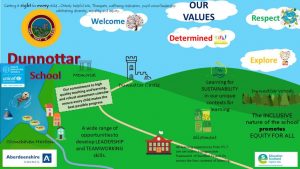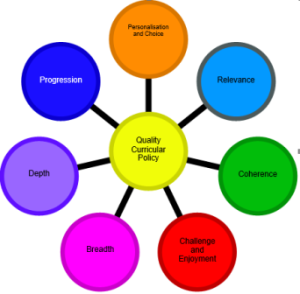Our Vision and Values
Our School Vision is
WE SHINE
– meaning –
We are Welcoming
We Explore
We Respect
We are Determined
Our Vision
At Dunnottar School, children can achieve their full potential in their academic, creative, personal, physical, moral and spiritual development. We recognise the benefits to the pupils, of parents and staff working together for the all-round development of each child.
The Curriculum for Excellence core values encompass the development of four key attributes, which are our aims;
- Successful Learners
- Confident Individuals
- Responsible Citizens
- Effective Communicators
The four contexts in which we will base our curricular developments on are as follows:
1. The Ethos and Life of the school as a community
We encourage pupils to take responsibility within the school. This allows them to have a say in aspects of what happens in school and allows them to see that they can make a difference. Some of the ways that we do this are:
- Buddy Schemes – P3 pupils are paired with younger pupils at playtimes and lunchtimes
- JRSO (Junior Road Safety Officer) – delivers important messages on road safety
- Young Leaders – teaching younger children to play co-operatively
- ECO group/Allotment Committee – help the school become more environmentally friendly
- Pupil Voice – making decisions about improvements to the school
- Charity Group – making decisions about charity events
- House Captains, Vice Captains and Prefects – lead whole school events and support HT to welcome school visitors and organise community events.
An ethos of open, positive, supportive relationships promote a climate where pupils feel safe and secure. Good behaviour, effort and attitudes are fostered through positive relationships and positive recognition. Pupils are encouraged to value themselves and others and develop effective citizenship skills. These skills are fostered through co-operative learning activities.
2. Curriculum Areas and Subjects
At Dunnottar School all our learners will experience a Broad General Education which will include all of the experiences and outcomes from across eight curricular areas, progressing through the levels. Pupils are supported in order to achieve their full potential in their academic, creative, personal, physical and moral development.

3. Inter-disciplinary Learning (IDL)
IDL is a key feature of Curriculum for Excellence, which enhances the curriculum and is reflected in our contextualised planning. We believe that this approach towards delivering the curriculum brings about rich rewards, allowing for increased and improved collaboration across subject areas and leads to exciting and challenging opportunities for our pupils to make connections across learning within the context of Broad General Education.
4. Opportunities for personal achievement
Throughout the school are our ‘Wider Achievements Walls’ demonstrating to the whole school community the high value we put on our pupils’ personal achievements. Our Charity Group leads initiatives that involve the whole school and develops the concept of giving. Our Eco Group and Pupil Voice support school improvements and help the school become more environmentally friendly. The wide and varied programme of extra curricular activities and clubs offer tremendous opportunities for all pupils.
Dunnottar School also host an annual “Celebration Awards Assembly” where personal achievements are recognised. The “4 A” Awards for “Always Academic”, “Always Artistic”, “Always Active” and “Always Kind” are decided through a nomination and voting process. Many other awards linked to each area of the curriculum are presented at this community event.
Design Principles
Curriculum for Excellence identifies seven principles for curriculum design that are considered and used to evaluate the effectiveness of our planned learner experiences, programmes and resources.
Learning and Teaching
The success of our curriculum is through the delivery of high-quality learning and teaching. This is at the heart of our work and the use of a variety of teaching methodologies is an essential feature of our curriculum. A wide range of teaching strategies are implemented by all staff, where approaches to learning and assessment are varied and pupil-centred. Assessment is for Learning (AifL) techniques, self and peer assessment, individual work, practical work, collaborative learning, and the use of ICT, outdoor learning, global citizenship, educational visits and visiting speakers are examples of approaches designed to actively engage our pupils in their learning.
Continued Professional Development (CPD) supports staff in the field of learning and teaching through the use of our Lesson Evaluation Toolkit. Colleagues use the toolkit to reflect on their own practice, share practice (within both the school and the Cluster), and identify their own next steps for learning incorporating new ways of engaging and supporting our learners. Our collegiate approaches to school improvement planning promotes high standards of consistency. Formal and informal observation, survey results, attainment analysis and feedback are considered to promote improvement. Resources are revised and enhanced as funding allows.
Transitions
At Dunnottar School we ensure that when moving on from Nursery to P1 through to P7, and when moving through Curriculum for Excellence levels, class teachers share information. Termly “Pastoral and Attainment” and “Planning” meetings ensure that class teachers share this information with Senior Management Team. This will include information about learning and achievements, examples of their work, records of their progress and other relevant information.
United Nations Convention on Rights of the Child
We have a class charter in each classroom for Nursery to Primary 7 which has been created by pupils and staff which sets out the rights, selected from the UNCRC (United Nations Convention on the Rights of the Child), which children and adults consider to be the most relevant in their class. The actions agreed between children and adults ensure that rights can be realised and enjoyed by everyone who has agreed to the charter.
Last year we did a lot of work to promote the Global Goals linked to United Conventions on Rights of the Child (UNCRC). We will continue to work on Global Goals and UNCRC this school year. Children in Primary 7 have been working on Global Goals presentations this year.

